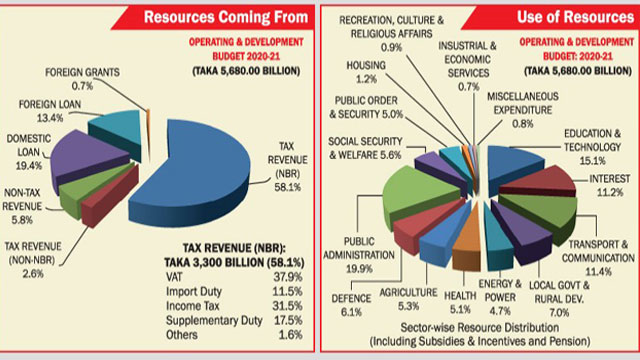The government on Thursday unveiled the national budget with an overambitious revenue target and a record deficit in order to ward off the havoc of the COVID-19 pandemic in the new financial year.
But economists said that achieving the revenue target would be an uphill task for the tax authorities as the COVID-19-induced economic downturn was likely to continue to impact on both demand and consumption in 2020-21.
The planned staggering amount of borrowing from the banking sector to meet the budget deficit would dampen the fund flow to the private sector as well as the job creation undermining the implementation of the overall budget worth Tk 5.68 lakh crore, they said.
In a brief 47-minute presentation at the Jatiya Sangsad, Finance minister AHM Mustafa Kamal proposed the new fiscal measures that included an unlimited scope for legalising untaxed assets like land, flats, cash and savings by undisclosed money holders, the allocation of a lump sum Tk 10,000 crore on account of the COVID-19 calamity and the imposition of penalty against over- and under-invoices.
In mostly a power-point presentation with one third of the parliament members present at the Sangsad, Mustafa Kamal also proposed relief to taxpayers by increasing the lowest taxable amount to Tk 3,00,000, reducing the highest income tax rate to 25 per cent from the current 30 per cent, and cutting corporate tax for non-listed entities.
But all these measures would not guarantee achieving the ambitious revenue target, said Centre for Policy Dialogue distinguished fellow Mustafizur Rahman.
Policy Research Institute executive director Ahsan H Mansur said that too much reliance on bank borrowing to meet the deficit of Tk 1.9 lakh crore, 6 per cent of the gross domestic product, would risk the credit flow to the already-affected private sector, the main driving force of the economy.
Not only the revenue target, but also the growth target, projected at 8.2 per cent, has been called ambitious by economists who had expected that the finance minister would be more specific spelling out the plan to tackle the COVID-19 calamity since the resumption of the fully-fledged economic activities was entirely dependent on the improvement of the health sector.
The finance minister referred ‘COVID-19’ on at least 42 occasions in his budget speech titled ‘Economic Transition and Pathway to Progress’ and acknowledged that the ‘COVID-19 pandemic has uncovered a number of weaknesses in our health sector’.
But he was only able to slightly increase the allocation for the health sector to 5.1 per cent of the budget outlay from the 4.9 per cent in the outgoing fiscal.
Besides, the finance minister proposed a 4.7 per cent allocation for the energy and power sector, a significant amount of which would be spent on the idle rental power plants in paying the controversial capacity charge to them.
A proposal has been made to spend 4.6 per cent of the overall budget fund for social security and welfare against the allocation of 6.12 per cent for defence, 11.4 per cent for transport and communication, 11.2 per cent for payment of interests, the highest 19.9 per cent for the public administration and 5.3 per cent for agriculture.
Ahsan H Mansur said that there had been an expectation that the allocation for the social safety net would be greater since millions of people of the informal sector lost their jobs due to the virus outbreak.
‘But the finance minister has failed to fulfil the expectation,’ he said.
According to the budget document, the government has proposed an allocation of Tk 95,574 crore for running the social safety net programmes under different ministries and divisions, which was Tk. 81,865 crore in the outgoing fiscal.
The fund has been targeted to bring at least 11 lakh new beneficiaries under the coverage of the social security programmes, although economists have found flaws with the present system of identifying the beneficiaries.
The government has already devised the annual development programme of Tk 2,02,721 crore for the new fiscal year with the transport sector once again getting the highest allocation of Tk 52,805.69 crore, or 26.5 per cent, of the total outlay.
The allocation of the highest Tk 15,000 crore to the Rooppur Nuclear Power Plant project was criticised by economists who said that the government should have been judicious in fund allocation to many unnecessary projects amid the virus outbreak.
The finance minister proposed hike in duties for using the cell phone when the income of 95 per cent people, according to a recent BRAC rapid survey, has fallen.
He proposed measures cutting the prices of locally-manufactured PPE, surgical masks, imported garlic, sugar, locally-produced mustard oil, agricultural machineries and solar battery.
The finance minister, however, said that the government had not been able to fulfil some commitments made in the outgoing budget due to the outbreak of COVID-19.
He pledged to implement them soon.-New Age





